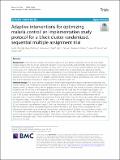Adaptive interventions for optimizing malaria control: an implementation study protocol for a block-cluster randomized, sequential multiple assignment trial

View/
Publication Date
2020Author
Guofa Zhou, Ming-chieh Lee, Harrysone E. Atieli, John I. Githure, Andrew K. Githeko, James W. Kazura & Guiyun Yan
Metadata
Show full item recordAbstract/
Background
In the past two decades, the massive scale-up of long-lasting insecticidal nets (LLINs) and indoor residual spraying (IRS) has led to significant reductions in malaria mortality and morbidity. Nonetheless, the malaria burden remains high, and a dozen countries in Africa show a trend of increasing malaria incidence over the past several years. This underscores the need to improve the effectiveness of interventions by optimizing first-line intervention tools and integrating newly approved products into control programs. Because transmission settings and vector ecologies vary from place to place, malaria interventions should be adapted and readapted over time in response to evolving malaria risks. An adaptive approach based on local malaria epidemiology and vector ecology may lead to significant reductions in malaria incidence and transmission risk.
Methods/design
This study will use a longitudinal block-cluster sequential multiple assignment randomized trial (SMART) design with longitudinal outcome measures for a period of 3 years to develop an adaptive intervention for malaria control in western Kenya, the first adaptive trial for malaria control. The primary outcome is clinical malaria incidence rate. This will be a two-stage trial with 36 clusters for the initial trial. At the beginning of stage 1, all clusters will be randomized with equal probability to either LLIN, piperonyl butoxide-treated LLIN (PBO Nets), or LLIN + IRS by block randomization based on their respective malaria risks. Intervention effectiveness will be evaluated with 12 months of follow-up monitoring. At the end of the 12-month follow-up, clusters will be assessed for “response” versus “non-response” to PBO Nets or LLIN + IRS based on the change in clinical malaria incidence rate and a pre-defined threshold value of cost-effectiveness set by the Ministry of Health. At the beginning of stage 2, if an intervention was effective in stage 1, then the intervention will be continued. Non-responders to stage 1 PBO Net treatment will be randomized equally to either PBO Nets + LSM (larval source management) or an intervention determined by an enhanced reinforcement learning method. Similarly, non-responders to stage 1 LLIN + IRS treatment will be randomized equally to either LLIN + IRS + LSM or PBO Nets + IRS. There will be an 18-month evaluation follow-up period for stage 2 interventions. We will monitor indoor and outdoor vector abundance using light traps. Clinical malaria will be monitored through active case surveillance. Cost-effectiveness of the interventions will be assessed using Q-learning.
Discussion
This novel adaptive intervention strategy will optimize existing malaria vector control tools while allowing for the integration of new control products and approaches in the future to find the most cost-effective malaria control strategies in different settings. Given the urgent global need for optimization of malaria control tools, this study can have far-reaching implications for malaria control and elimination.
